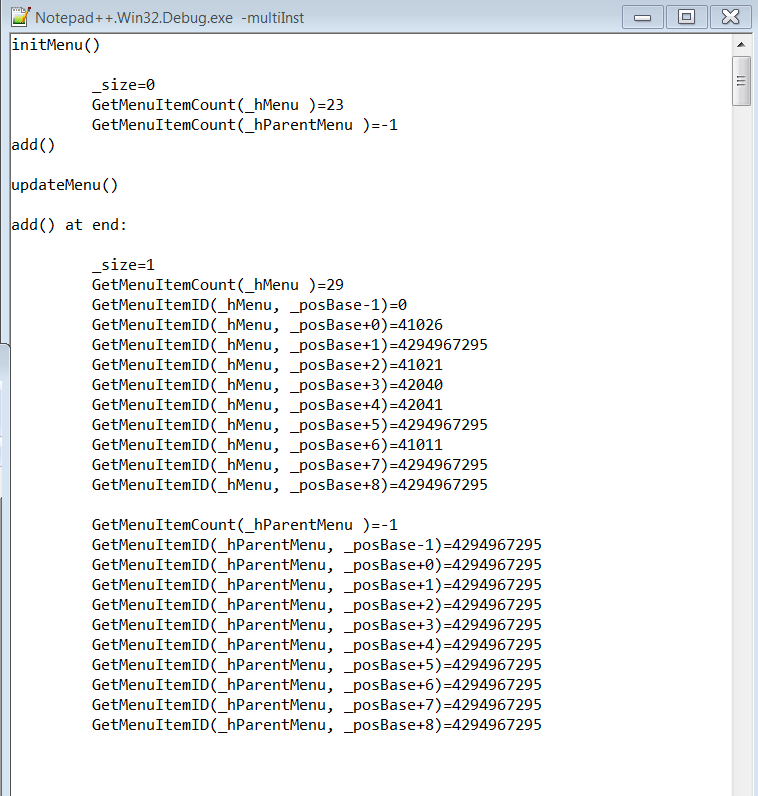Debugging Npp .exe without a debugger (beginner)
-
@Victorel-Petrovich said in Debugging Npp .exe without a debugger (beginner):
Everywhere I read (including 2 ref-s above , and at microsoft) they say OutputDebugString() is for when the app is run from / has a debugger .
… but it is not limited to be used only by debuggers. Applications like debugview from sysinternals tools can be used to get this output.
or a pythons script like
import ctypes from ctypes.wintypes import HANDLE, DWORD, BOOL, LPVOID, LPCWSTR, LPHANDLE import mmap import struct import os from Npp import console console.show() kernel32 = ctypes.WinDLL('kernel32', use_last_error=True) CreateEventW = kernel32.CreateEventW CreateEventW.argtypes = [LPVOID, BOOL, BOOL, LPCWSTR] CreateEventW.restype = HANDLE SetEvent = kernel32.SetEvent SetEvent.argtypes = [HANDLE] SetEvent.restype = BOOL WaitForSingleObject = kernel32.WaitForSingleObject WaitForSingleObject.argtypes = [HANDLE, DWORD] WaitForSingleObject.restype = DWORD WaitForMultipleObjects = kernel32.WaitForMultipleObjects WaitForMultipleObjects.argtypes = [DWORD, LPHANDLE, BOOL, DWORD] WaitForMultipleObjects.restype = DWORD CloseHandle = kernel32.CloseHandle CloseHandle.argtypes = [HANDLE] CloseHandle.restype = BOOL BUFFER_READY = kernel32.CreateEventW(None, 0, 0, 'DBWIN_BUFFER_READY') DATA_READY = kernel32.CreateEventW(None, 0, 0, 'DBWIN_DATA_READY') STOP_DBG_LOOP = kernel32.CreateEventW(None, 0, 0, 'STOP_DBG_LOOP') HANDLES = (HANDLE * 2)(DATA_READY, STOP_DBG_LOOP) buffer = mmap.mmap(0, 4096, "DBWIN_BUFFER", mmap.ACCESS_WRITE) CURRENT_NPP_ID = os.getpid() # Call SetEvent(STOP_DBG_LOOP) to stop the loop, # either with a second script or by calling from the PS console while True: SetEvent(BUFFER_READY) result = WaitForMultipleObjects(2, HANDLES, False, 0xFFFFFFFF) if result == 1: # STOP_DBG_LOOP received break elif result == 0: buffer.seek(0) process_id, = struct.unpack("L", buffer.read(4)) data = buffer.read(4092) if CURRENT_NPP_ID != process_id: # to prevent seeing PS's own debug strings. if b"\0" in data: data = data[:data.index(b"\0")] print("Process:[{0}] {1}".format(process_id, data.decode().strip())) else: print('ooppss: {}'.format(result)) break CloseHandle(BUFFER_READY) CloseHandle(DATA_READY) CloseHandle(STOP_DBG_LOOP) print('done') -
@Ekopalypse you’re a wizard
-
I’ve just downloaded DebugView from sysinternals (easy to use), and read in several pages about
OutputDebugString().
So, yes, it’s good if you don’t want to create a console in the app withAllocConsole()like above.
But then you usually need to prepare the formatted string in advance usingsprintf()or similar, then pass to OutputDebugString… (Or write a special function to do it… again extra inserted code or files).
Soprintf()is easier to use (at least for most practical cases, IMO), and already familiar. -
@Victorel-Petrovich said in Debugging Npp .exe without a debugger (beginner):
So printf() is easier to use (at least for most practical cases, IMO), and already familiar.
Really, only because you already have the “console” approach in your rearview mirror.
If someone didn’t have that, OutputDebugString is easier.
It’s just a matter of (in very simple terms):
char buf[1024];
sprintf(buf, “test”);
OutputDebugString(buf); -
@Alan-Kilborn said in Debugging Npp .exe without a debugger (beginner):
It’s just a matter of (in very simple terms):
char buf[1024];
sprintf(buf, “test”);
OutputDebugString(buf);But when you have several tens of outputs to write in every function you test… :/

-
@Victorel-Petrovich said in Debugging Npp .exe without a debugger (beginner):
But when you have several tens of outputs to write in every function you test
Hmm, no idea why that’s a problem…
I think if this is how you’re considering debugging Notepad++ changes you might make…it is going to wear you down fast and you’ll give up trying to make changes.
-
@Alan-Kilborn With column-mode editing, and duplication of lines etc, it’s not that bad.
Much harder is to understand why I don’t get the results I expect, doing lots of googling , and try again and again. -
Another option, pointed out to me by @Yaron10 on github:
printInt(int int2print)andprintStr(const TCHAR *str2print)
Will output in a message box…
Comparable with OutputDebugString in the need to prepare the (complex) string beforehand, but doesn’t require a debugger or allocating a console.
https://github.com/notepad-plus-plus/notepad-plus-plus/blob/master/PowerEditor/src/MISC/Common/Common.cpp#L32
(The definitions also hint at how to properly pass the string). -
P PeterJones moved this topic from General Discussion on
-
Topic moved to the newly renamed and refocused “Notepad++ & Plugin Development” category, where it naturally fits (I assumed @Victorel-Petrovich wouldn’t mind it being moved, since he was the one who wanted a specific place to ask such questions).
Personally, when I am doing a lot of print-based debugging, I write wrapper functions or #define macros that encapsulate all the formatting into the string, and then call the proper output function with that string, so that I can just have a single line of code for each inline debug print, and I let the complications of definining a dummy buffer variable and the sprintf formatting elsewhere.
But really, none of these questions are specific to debugging Notepad++, and is really a generic C/C++ “best way to debug without a debugger, without a console, or similar restriction” question.
-
@PeterJones said in Debugging Npp .exe without a debugger (beginner):
I assumed @Victorel-Petrovich wouldn’t mind it being moved
True